Wonder Woman and Aquaman are the only charismatic leads in Justice League
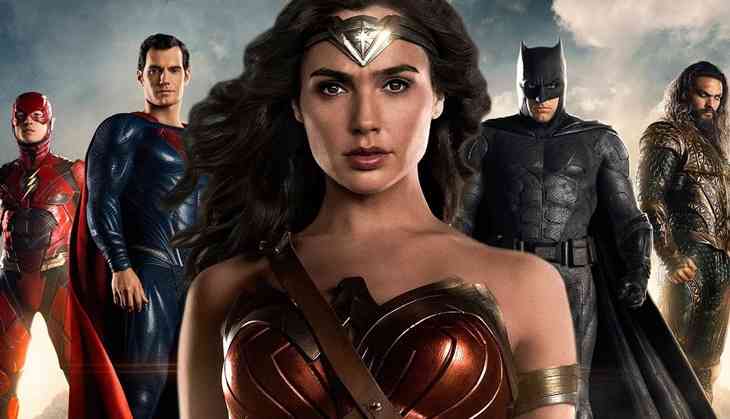
Films based on DC comics have tended to be meaner, more violent, and more downbeat than their Marvel equivalents. This is, perhaps, because of the popularity of urban vigilante Batman, brought to the screen in Tim Burton’s grotesque, nightmarish films, and then Christopher Nolan’s brutal crime sagas.
Justice League, the new DC film directed by Zack Snyder, begins in this vein, opening with a wonderfully noirish sequence set in Gotham city’s neon-lit, rain-soaked streets, in which Batman (Ben Affleck) fights a hellish demon. This opening recalls the kind of hyper-real, neon-noir aesthetic of Snyder’s earlier Watchmen (2009) and Sucker Punch (2011).
Unfortunately, the tone of Justice League rapidly changes as it leaves Gotham after the first ten minutes or so. This represents perhaps the biggest problem with the film as a whole – it lacks coherency across several key levels, including narrative, performances, tone and style.
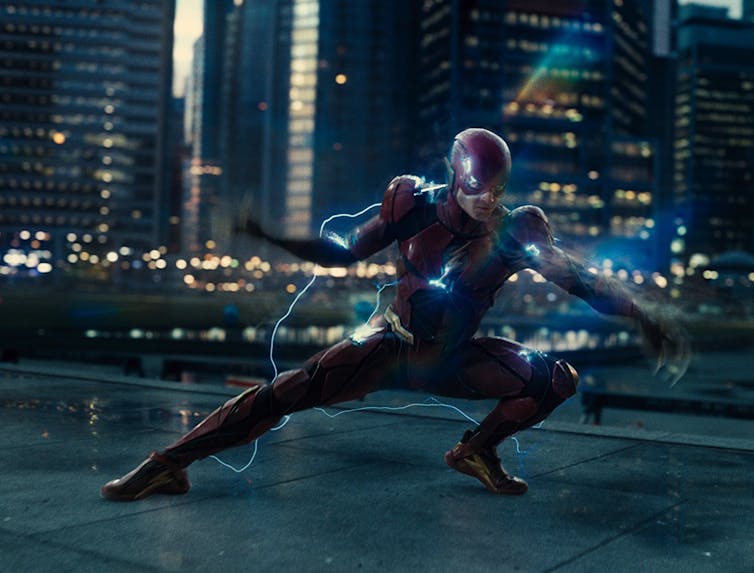
Fans of the recent Batman v Superman: Dawn of Justice (2016) may disagree, but Justice League suffers, first and foremost, from the perennial problem of such “cinematic universe” fare: it relies too heavily on material from earlier films.
The story goes something like this. An apocalypse-loving villain, known as Steppenwolf (who in no way resembles Harry Haller) is resurrected and begins to wreak havoc on the world. Along with his legion of nightmare creatures – winged, demonic things that live off fear – he is looking to find and reunite three magical boxes, known, for some reason, as “mother boxes.” When brought together, this will lead to an apocalyptic event known, for some reason, as the Unity. He will then take his place “among the new gods,” as he informs the viewer on finding the second box.
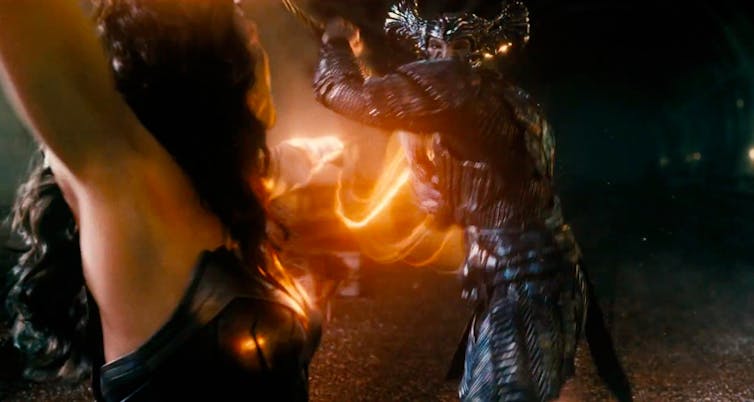
Batman, meanwhile, believing (arch-paranoiac he is) that “enemies are coming,” assembles a team of superheroes to fight Steppenwolf. He summons Wonder Woman (Gal Godot), and together they convince Aquaman (Jason Mamoa), The Flash (Ezra Miller) and Cyborg (Ray Fisher) to join them on their mission. When they discover that they are not strong enough to defeat Steppenwolf, they magically resurrect Superman (Henry Cavill), and the film ends with the six of them defeating Steppenwolf. (There’s no spoiler here – it’s a superhero film, what else could happen?)
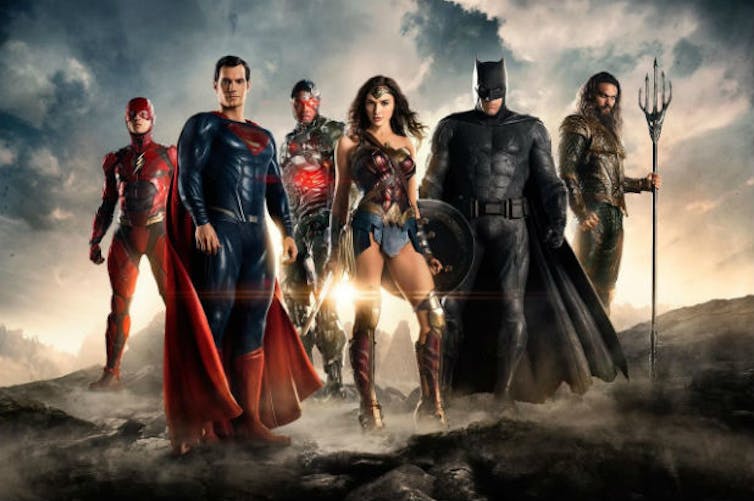
Justice League is clearly set in a world reflecting current trends, and Snyder et al. consciously embed the film in this post-9/11, post-global warming, post-Brexit, and post-Trump context. The opening credit sequence – the best in the film – features Norwegian pop singer Sigrid’s rendition of Leonard Cohen’s Everybody Knows behind a slow motion montage of various contemporary atrocities: a white supremacist terrorises a Muslim grocer, a homeless man sits on a rain-soaked urban street with a sign reading “I tried.”
Wonder Woman is then introduced taking down a group in London who describe themselves as “a small group of reactionary terrorists” before trying to shoot a bunch of school girls. “This is man’s only hope,” their leader pontificates. “Down with the modern world! Back to the dark ages and the safety of holy fear.”
The narrative framework – the assembly of a team to take down a baddie, The Dirty Dozen superhero style – could have been the basis of a razor-sharp, effectively self-contained film.
As it is, Justice League is very uncomfortably paced; after a fine “recruitment” section, the film becomes lumped down in an uncomfortable blend of expositional scenes, full of typical superhero-film speeches about responsibility, justice, etc. interspersed with some genuinely unimaginative action sequences, most of which rely far too heavily on CGI. For a director as visually inventive as Snyder, auteur of the post-MTV age, these sequences are remarkably tedious.
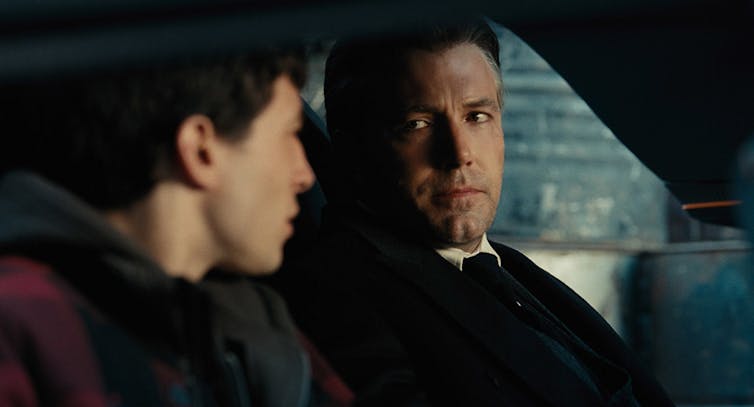
Affleck, reprising his role as the caped crusader from Batman v Superman, is uninspiring. Fine at playing dramatically realistic roles, his Bruce Wayne seems tired and wooden. Despite popular wisdom, it is much more difficult to play a cartoonish character well than a realistic character, as the balance between caricature and emotional truth is very difficult to achieve, and few actors can pull it off – Ben Affleck is no Michael Keaton.
Ezra Miller, as The Flash, likewise seems out of his depth, and his performance seems silly and one-dimensional. Ray Fisher as Cyborg is forgettable. Really, only Gal Godot as Wonder Woman – and Justice League is clearly banking on the success of the much better film, Wonder Woman – and Jason Mamoa as Aquaman are the only two lead actors with any charisma here.
The supporting cast, replete with excellent actors like David Thewlis, Jeremy Irons, Diane Lane, J. K. Simmons and Connie Nielsen, is wasted, given minimal screen time.
Snyder has made some good films in the past – his remake of Dawn of the Dead (2004) was the best of that bunch of horror remakes from the early 2000s – but Justice League is disappointing. It’s loud and colourful, but that’s about it.
![]() Justice League opens in Australian cinemas today.
Justice League opens in Australian cinemas today.
Ari Mattes, Lecturer in Media Studies, University of Notre Dame Australia
This article was originally published on The Conversation. Read the original article.

